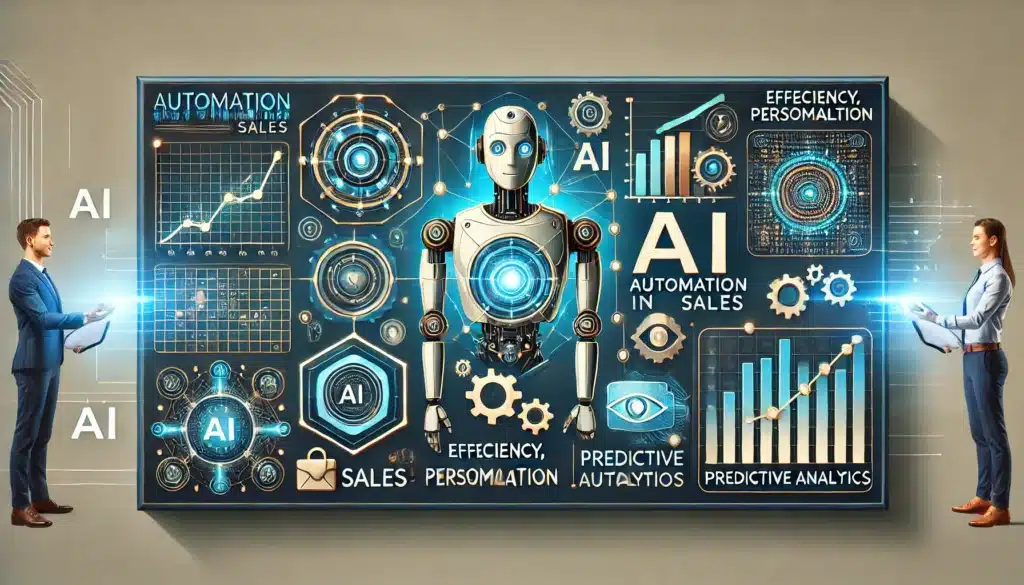In today’s fast-paced business world, incorporating AI and automation into your sales processes is essential for staying competitive and boosting revenue. These technologies can transform the way sales teams work, making operations more efficient, streamlining workflows, and enabling personalized interactions with potential customers.
Benefits of Using AI and Automation in Sales
Boosting Sales Efficiency
AI and automation can handle repetitive tasks like data entry, scheduling, and updating customer records, freeing up sales teams to focus on building relationships and closing deals. The time saved through automation can be spent on more valuable activities, leading to higher productivity.
Better Lead Generation
AI tools excel at lead generation by analyzing customer data, predicting buying behaviors, and identifying high-potential leads. This means sales teams can target the right audience with personalized marketing campaigns, increasing conversion rates and improving ROI.
Enhancing Sales Team Performance
Automation tools streamline workflows, prioritize tasks, and track performance metrics in real-time. This ensures smooth communication and coordination within the team. By automating manual processes, sales reps can concentrate on activities that drive revenue and contribute to team success.
How AI Tools Help Automate the Sales Process
Personalized Sales Pitches
AI algorithms analyze customer data to create personalized sales pitches that resonate with individual prospects. Understanding customer needs and behaviors helps tailor messaging and offers, boosting the chances of successful engagements.
Automated Follow-Ups and Engagement
AI-powered tools can schedule follow-up emails, calls, and reminders based on prospect interactions. This ensures consistent communication and prevents missed opportunities, keeping leads engaged and moving through the sales funnel.
Predictive Sales Analytics
AI tools analyze historical sales data and market trends to provide predictive insights that guide sales strategies. By forecasting sales trends and identifying potential risks, AI helps sales teams make informed decisions and optimize their efforts.

Key Features to Look for in Sales Automation Tools
Seamless Integration
The best sales automation tools integrate smoothly with existing CRM systems, communication platforms, and marketing software. This ensures data consistency and efficient workflows, giving sales teams a unified view of all relevant information.
Customizable Workflows
Look for tools that allow you to customize automation workflows to fit your specific sales processes. Being able to define rules, triggers, and conditions for automation makes these tools adaptable and flexible for your unique needs.
AI-Powered Forecasting and Pipeline Management
Advanced AI-enabled tools offer robust forecasting capabilities, helping predict sales outcomes, identify growth opportunities, and manage pipelines effectively. Accurate revenue projections and strategic insights are invaluable for meeting sales targets.
Improving Sales Team Performance with AI
Actionable Insights for Reps
AI tools provide real-time insights, performance metrics, and recommendations to enhance decision-making. By analyzing vast amounts of data, AI equips sales teams with valuable information on customer preferences, market trends, and competitive analysis, driving business growth.
Automating Repetitive Tasks
AI can automate mundane tasks like data entry, lead scoring, and report generation, allowing sales professionals to focus on high-impact activities that require human creativity and judgment. This optimizes workflow and boosts efficiency.
Enhancing Customer Interactions
AI-powered sales assistants, such as chatbots and virtual assistants, simulate human-like interactions with customers, providing immediate responses, personalized recommendations, and 24/7 support. This improves customer experience and engagement.
Future of AI in B2B Sales Automation
Full Integration Across the Sales Stack
The future lies in integrating AI throughout the entire sales process, from lead generation to customer retention. This creates a unified, data-driven approach to sales management, enhancing efficiency and scalability.
Aligning Sales and Marketing
AI tools help align sales and marketing by providing shared insights, collaborative platforms, and integrated processes. This alignment ensures consistent messaging and maximizes revenue opportunities.
Enhancing Outbound Sales
AI technologies improve outbound sales by personalizing outreach and targeting ideal prospects. With AI, sales teams can prioritize leads, personalize content, and segment prospects effectively, leading to higher engagement and conversions.
Why You Should Use AI and Automation for Sales
Using AI and automation in sales processes is crucial for staying competitive and driving revenue growth. These technologies enhance efficiency, streamline processes, and enable personalized interactions with prospects.
Benefits of AI and Automation
- Improved Sales Efficiency: Automating repetitive tasks allows sales reps to focus on high-value activities, driving revenue more effectively. Manual processes like data entry and lead management are streamlined, improving overall efficiency.
- Enhanced Lead Generation: AI tools analyze vast amounts of data to identify potential prospects, prioritize leads, and deliver personalized communications at the right time. This optimizes lead generation strategies and boosts conversion rates.
- Boosting Team Performance: AI and automation provide valuable insights and predictive analytics, helping sales leaders understand customer behavior and make data-driven decisions. This tailored approach enhances team performance.
How AI and Automation Help Sales Teams
- Advanced Functionalities: AI-powered tools offer real-time insights and predictive analytics, enabling better decision-making and targeted sales strategies. These tools streamline processes, allowing reps to focus on building relationships and closing deals.
- Personalized Interactions: AI enables personalized interactions by leveraging data to create tailored messaging and content. This leads to more engaging sales experiences and higher conversion rates.
- Streamlining Processes: Automation handles routine tasks like follow-up emails, scheduling, and updating records, saving time and ensuring consistency in sales communications.
Popular AI Sales Automation Tools
- AI Sales Assistants: Virtual assistants powered by AI provide real-time support and insights, enhancing productivity and efficiency.
- AI Sales Stack Solutions: These tools integrate AI across the entire sales cycle, from lead generation to post-sales support, offering a unified view of customer data and interactions.
- Outbound Sales Automation: AI-driven platforms automate outbound prospecting activities, reaching more prospects in less time and driving higher engagement rates.



